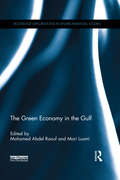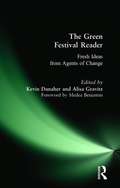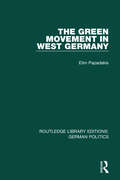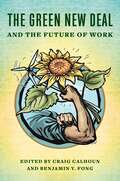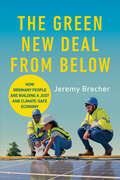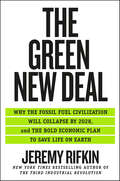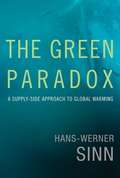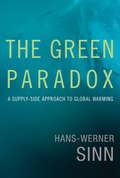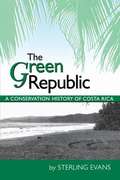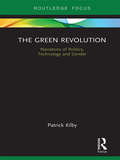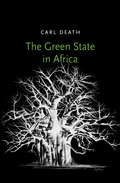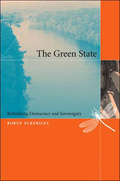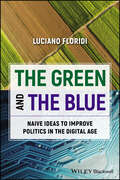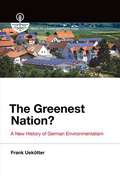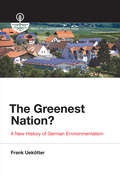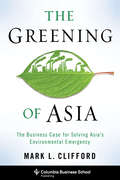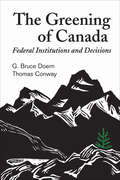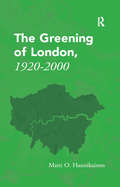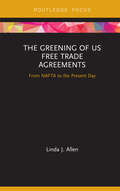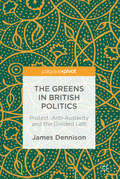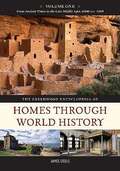- Table View
- List View
The Green Economy in the Gulf: Lessons From The Uae's State-led Energy Transition (Routledge Explorations in Environmental Studies)
by Mohamed Abdel Raouf Mari LuomiFilling a void in academic and policy-relevant literature on the topic of the green economy in the Arabian Gulf, this edited volume provides a multidisciplinary analysis of the key themes and challenges relating to the green economy in the region, including in the energy and water sectors and the urban environment, as well as with respect to cross-cutting issues, such as labour, intellectual property and South-South cooperation.Over the course of the book, academics and practitioners from various fields demonstrate why transitioning into a ‘green economy’ – a future economy based on environmental sustainability, social equity and improved well-being – is not an option but a necessity for the Gulf Cooperation Council (GCC) States. Through chapters covering key economic sectors and cross-cutting issues, the book examines the GCC states’ quest to align their economies and economic development with the imperatives of environmental sustainability and social welfare, and proposes a way forward, based on lessons learned from experiences in the region and beyond.This volume will be of great relevance to scholars and policy makers with an interest in environmental economics and policy.
The Green Factor In German Politics: From Protest Movement To Political Party
by Gerd LangguthThe Green Party evolved out of a number of protest movements of the late 1960s and 1970s and became a major political factor in the Federal Republic of Germany in 1983 when it drew enough votes to send twenty-seven members to the Bundestag. The author follows the party’s rise from new social and ecological groups to its current place in the Federal parliament and provincial legislatures. He addresses the questions raised by Green Party members and by the unrest they have engendered—whether they believe in parliamentary democracy, what effect their policy of replacing delegates in parliament at midsession will have on the parliament and the party, and how they relate to Germany’s traditional political parties. The answers to these and other questions form the background for an appraisal of the Green party in which the author traces the development of its role from a political irritant to a factor of serious influence.
The Green Festival Reader: Fresh Ideas from Agents of Change
by Kevin Danaher Alisa GravitzThe Green Festivals now draw over 100,000 visitors every year in four U.S. cities. This book collects the most memorable talks from all four festivals on the most urgent social issues of the day.
The Green Flag: A History of Irish Nationalism
by Robert KeeCovering Irish history from the beginnings of Irish Nationalism through 1973, Robert Kee's treatment ranges from the Protestant Plantations through Wolfe Tone and the Great Famine to the founding of the Fenian Movement and the Irish Free State. His authoritative and comprehensive history is masterly in its detail and judicious analysis. A classic in its field, this is essential reading for anyone attempting to understand the complex historical forces that have shaped Ireland.
The Green Movement in Iran
by Hamid DabashiThe Green Movement in Iran contains Hamid Dabashi's most important writings on the Iran's June 2009 election, its tumultuous aftermath, and the characteristics and aspirations of the emerging Green Movement. These analyses range from close analysis of the nature of the events to the Green Movement's historical background and future political consequences. The writings have been modified and updated for book publication. The volume presents Dabashi's account of the events since June 12, 2009-the Election Day itself-and his recap of highlights of the build-up period to the mass protests. He provides insightful background for events on the ground, dealing with debates about the credibility of the election. He then discusses political continuity in Iran, as well as the characteristics of the Green Movement. Dabashi argues that the reaction of the custodians of the Islamic Republic to the charge of the election being a fraud only affirms its lost legitimacy, and casts the system as being neither "Islamic" nor a "republic." Dabashi also comments on US politics and its relations to Iran and the Green Movement, pointing out shortcomings in American media culture. The role of the Iranian opposition in the Green Movement and American political policies, the political and economic consequence of the U.S. sanctions against Iran, and the way these may be interpreted by Iranian society are all viewed from an enlightening perspective. Dabashi argues that the Iranian regime, suffering deeply from legitimacy issues, makes use of its bureaucratic, economic, and political leverage to stage a show of support and project division among the people.
The Green Movement in West Germany (Routledge Library Editions: German Politics)
by Elim PapadakisThe Green Movement in Germany is widely regarded as one of the most powerful expressions of popular opposition to government policies. A broad analysis of this powerful group is made in this book, showing that the origins of the movement relate to the general protests against industrialisation in the nineteenth century and also to more recent forms of protest. The author assesses the challenge posed by the Green Movement to established groups and organisations both in proposing alternative policies and in a long run of electoral successes. The Green Movement has evidently had a great impact on assumptions about defence, welfare and environmental policies. Data from major surveys on public attitudes and interviews with senior officials complete the picture of the practical and theoretical dimensions of the Green Movement.
The Green New Deal and the Future of Work
by Raj Patel Harvey Molotch Harry C. Boyte Richard Lachmann Stephanie Luce Richard A. Walker Clark A. Miller Trygve Throntveit Alyssa Battistoni Daniel Aldana Cohen Hillary Angelo Olúfẹ́mi O. Táíwò Jim Goodman Wilson Sherwin Dustin Guastella Mindy Isser Todd E. Vachon J. Mijin Cha Lara SkinnerCatastrophic climate change overshadows the present and the future. Wrenching economic transformations have devastated workers and hollowed out communities. However, those fighting for jobs and those fighting for the planet have often been at odds. Does the world face two separate crises, environmental and economic? The promise of the Green New Deal is to tackle the threat of climate change through the empowerment of working people and the strengthening of democracy. In this view, the crisis of nature and the crisis of work must be addressed together—or they will not be addressed at all.This book brings together leading experts to explore the possibilities of the Green New Deal, emphasizing the future of work. Together, they examine transformations that are already underway and put forth bold new proposals that can provide jobs while reducing carbon consumption—building a world that is sustainable both economically and ecologically. Contributors also debate urgent questions: What is the value of a federal jobs program, or even a jobs guarantee? How do we alleviate the miseries and precarity of work? In key economic sectors, including energy, transportation, housing, agriculture, and care work, what kind of work is needed today? How does the New Deal provide guidance in addressing these questions, and how can a Green New Deal revive democracy? Above all, this book shows, the Green New Deal offers hope for a better tomorrow—but only if it accounts for work’s past transformations and shapes its future.
The Green New Deal from Below: How Ordinary People Are Building a Just and Climate-Safe Economy
by Jeremy BrecherA visionary program for national renewal, the Green New Deal aims to protect the earth’s climate while creating good jobs, reducing injustice, and eliminating poverty. Its core principle is to use the necessity for climate protection as a basis for realizing full employment and social justice. Jeremy Brecher goes beyond the national headlines and introduces readers to the community, municipal, county, state, tribal, and industry efforts advancing the Green New Deal across the United States. Brecher illustrates how such programs from below do the valuable work of building constituencies and providing proofs of concept for new ideas and initiatives. Block by block, these activities have come together to form a Green New Deal built on a strong foundation of small-scale movements and grassroots energy. A call for hope and a better tomorrow, The Green New Deal from Below offers a blueprint for reconstructing society on new principles to avoid catastrophic climate change.
The Green New Deal: Why the Fossil Fuel Civilization Will Collapse by 2028, and the Bold Economic Plan to Save Life on Earth
by Jeremy RifkinNew York Times–Bestselling Author: The renowned economic theorist explains how America can—and must—create a post-fossil fuel culture to survive.We can’t keep doing business as usual. Facing a global emergency, a younger generation has spearheaded a national conversation around a Green New Deal—a movement with the potential to revolutionize society. But while the Green New Deal has become a lightning rod in the political sphere, there is a parallel movement emerging within the business community that will shake the very foundation of the global economy in coming years.Key sectors of the economy are fast-decoupling from fossil fuels in favor of ever-cheaper solar and wind energies and the new business opportunities and employment that accompany them. New studies are sounding the alarm that trillions of dollars in stranded fossil fuel assets could create a carbon bubble likely to burst by 2028, causing the collapse of the fossil fuel civilization. The marketplace is speaking, and governments will need to adapt if they are to survive and prosper.In The Green New Deal, Jeremy Rifkin delivers the political narrative and economic plan for the Green New Deal that we need at this critical moment in history. The concurrence of a stranded fossil fuel assets bubble and a green political vision opens up the possibility of a massive shift to a post-carbon ecological era, in time to prevent a temperature rise that will tip us over the edge into runaway climate change. With twenty-five years of experience implementing Green New Deal–style transitions for both the European Union and the People’s Republic of China, Rifkin offers his vision for how to transform the global economy and save life on Earth.“The Green New Deal takes a stance quite different from that of typical Green New Deal supporters . . . he’s interested in building factories, farms, and vehicles in a fossil-free world, asserting that ‘the Green New Deal is all about infrastructure.’” —The New York Times Book Review“An urgent endorsement of efforts to remake a doomed fossil-fuel economy before it’s too late.” —Kirkus Reviews
The Green Paradox
by Hans-Werner SinnThe Earth is getting warmer. Yet, as Hans-Werner Sinn points out in this provocative book, the dominant policy approach--which aims to curb consumption of fossil energy--has been ineffective. Despite policy makers' efforts to promote alternative energy, impose emission controls on cars, and enforce tough energy-efficiency standards for buildings, the relentlessly rising curve of CO2 output does not show the slightest downward turn. Some proposed solutions are downright harmful: cultivating crops to make biofuels not only contributes to global warming but also uses resources that should be devoted to feeding the world's hungry. In The Green Paradox, Sinn proposes a new, more pragmatic approach based not on regulating the demand for fossil fuels but on controlling the supply. The owners of carbon resources, Sinn explains, are pre-empting future regulation by accelerating the production of fossil energy while they can. This is the "Green Paradox": expected future reduction in carbon consumption has the effect of accelerating climate change. Sinn suggests a supply-side solution: inducing the owners of carbon resources to leave more of their wealth underground. He proposes the swift introduction of a "Super-Kyoto" system--gathering all consumer countries into a cartel by means of a worldwide, coordinated cap-and-trade system supported by the levying of source taxes on capital income--to spoil the resource owners' appetite for financial assets. Only if we can shift our focus from local demand to worldwide supply policies for reducing carbon emissions, Sinn argues, will we have a chance of staving off climate disaster.
The Green Paradox: A Supply-Side Approach to Global Warming
by Hans-Werner SinnA leading economist develops a supply-side approach to fighting climate change that encourages resource owners to leave more of their fossil carbon underground.The Earth is getting warmer. Yet, as Hans-Werner Sinn points out in this provocative book, the dominant policy approach—which aims to curb consumption of fossil energy—has been ineffective. Despite policy makers' efforts to promote alternative energy, impose emission controls on cars, and enforce tough energy-efficiency standards for buildings, the relentlessly rising curve of CO2 output does not show the slightest downward turn. Some proposed solutions are downright harmful: cultivating crops to make biofuels not only contributes to global warming but also uses resources that should be devoted to feeding the world's hungry. In The Green Paradox, Sinn proposes a new, more pragmatic approach based not on regulating the demand for fossil fuels but on controlling the supply.The owners of carbon resources, Sinn explains, are pre-empting future regulation by accelerating the production of fossil energy while they can. This is the “Green Paradox”: expected future reduction in carbon consumption has the effect of accelerating climate change. Sinn suggests a supply-side solution: inducing the owners of carbon resources to leave more of their wealth underground. He proposes the swift introduction of a “Super-Kyoto” system—gathering all consumer countries into a cartel by means of a worldwide, coordinated cap-and-trade system supported by the levying of source taxes on capital income—to spoil the resource owners' appetite for financial assets.Only if we can shift our focus from local demand to worldwide supply policies for reducing carbon emissions, Sinn argues, will we have a chance of staving off climate disaster.
The Green Republic: A Conservation History of Costa Rica
by Sterling EvansWith over 25 percent of its land set aside in national parks and other protected areas, Costa Rica is renowned worldwide as "the green republic. " In this very readable history of conservation in Costa Rica, Sterling Evans explores the establishment of the country's national park system as a response to the rapid destruction of its tropical ecosystems due to the expansion of export-related agriculture. Drawing on interviews with key players in the conservation movement, as well as archival research, Evans traces the emergence of a conservation ethic among Costa Ricans and the tangible forms it has taken. In Part I, he describes the development of the national park system and "the grand contradiction" that conservation occurred simultaneously with massive deforestation in unprotected areas. In Part II, he examines other aspects of Costa Rica's conservation experience, including the important roles played by environmental education and nongovernmental organizations, campesino and indigenous movements, ecotourism, and the work of the National Biodiversity Institute.
The Green Revolution: Narratives of Politics, Technology and Gender (Earthscan Food and Agriculture)
by Patrick KilbyThis book reviews the Green Revolution, starting with its inception and development from the 1940s to the 1970s, and leading to what is commonly referred to as a second Green Revolution in the 2000s. Building on the historical assessment, it draws insights for contemporary policy debates and demonstrates important lessons for the here and now. ‘Green Revolution’ refers to the technical measures employed to increase food (particularly grain) production, based mainly on improved seed varieties for higher yields and pest resistance. For it to be successful the Green Revolution often required land reform, investments in irrigation and fertilizer supply that were not available to women and marginal farmers. This book analyses three underlying principles that have guided green revolutions: the political environment in which they were set; how they contributed to both the successes and challenges the Green Revolution continues to face; and the systemic institutional barriers for access to these agricultural production advances, with a focus on how gender relations limit the inclusion of women even when they are the principle cultivators and farm managers. The book draws on experiences in Mexico, India and China, examining government policy, the role of the family farm, and key issues around the inclusion of women. In doing so, this book connects the history of the Green Revolution with contemporary policy debates on the developing world, particularly in relation to Africa and Asia, around foreign aid and agricultural research. It also specifically establishes that greater inclusivity for women and other marginalised farming communities will significantly enhance the effectiveness of these programs. Interlinking themes of development policy, gender, and agricultural research, this book will be of great interest to students and scholars of agricultural development, food security, and sustainable development, as well as policymakers and practitioners working in international aid and agri-food policies.
The Green State in Africa
by Carl DeathA provocative reassessment of the relationship between states and environmental politics in Africa From climate-related risks such as crop failure and famine to longer-term concerns about sustainable urbanization, environmental justice, and biodiversity conservation, African states face a range of environmental issues. As Carl Death demonstrates, the ways in which they are addressing them have important political ramifications, and challenge current understandings of green politics. Death draws on almost a decade of research to reveal how central African environmental politics are to the transformation of African states.
The Green State: Rethinking Democracy and Sovereignty
by Robyn EckersleyWhat would constitute a definitively "green" state? In this important new book, Robyn Eckersley explores what it might take to create a green democratic state as an alternative to the classical liberal democratic state, the indiscriminate growth-dependent welfare state, and the neoliberal market-focused state—seeking, she writes, "to navigate between undisciplined political imagination and pessimistic resignation to the status quo." In recent years, most environmental scholars and environmentalists have characterized the sovereign state as ineffectual and have criticized nations for perpetuating ecological destruction. Going consciously against the grain of much current thinking, this book argues that the state is still the preeminent political institution for addressing environmental problems. States remain the gatekeepers of the global order, and greening the state is a necessary step, Eckersley argues, toward greening domestic and international policy and law.The Green State seeks to connect the moral and practical concerns of the environmental movement with contemporary theories about the state, democracy, and justice. Eckersley's proposed "critical political ecology" expands the boundaries of the moral community to include the natural environment in which the human community is embedded. This is the first book to make the vision of a "good" green state explicit, to explore the obstacles to its achievement, and to suggest practical constitutional and multilateral arrangements that could help transform the liberal democratic state into a postliberal green democratic state. Rethinking the state in light of the principles of ecological democracy ultimately casts it in a new role: that of an ecological steward and facilitator of transboundary democracy rather than a selfish actor jealously protecting its territory.
The Green and The Blue: Naive Ideas to Improve Politics in the Digital Age
by Luciano FloridiPresenting an array of innovative concepts to revolutionize politics in our digital world, this book is written by one of the most authoritative voices of contemporary philosophy The Green and the Blue explores the opportunities presented by the digital age for combining green environmental policies with blue digital solutions to strengthen democracy, reform capitalism, and work toward a sustainable and equitable future. With an engaging and readable style, world-renowned philosopher Luciano Floridi lays out a timely and convincing case for embracing responsible practices to ensure a sustainable environment, a better democracy, and an equitable information society. Drawing from his expertise in digital ethics and the philosophy of technology, Floridi offers fresh perspectives, innovative ideas, and bold strategies for improving political systems that emphasize the importance of cooperation, ethics, and long-term planning. Throughout the text, the author advocates for a political and economic framework of care that focuses on the quality of relations and processes rather than consumption and things. A groundbreaking call to action for individuals, policymakers, and technologists, The Green and the Blue: Naive Ideas to Improve Politics in the Digital Age: Provides a comprehensive, interdisciplinary, and well-rounded exploration of how to improve the present by designing good policies for the future Features insightful analysis by the founder of the philosophy of information and one of the key interpreters of the digital revolution Explains complex concepts to allow easy understanding and application of the ideas presented Includes compelling thought experiments that challenge traditional notions of capitalism and politics Encourages readers to think critically about the present and future of politics Offering a new way of thinking about democracy, the environment, and technology, The Green and the Blue: Naive Ideas to Improve Politics in the Digital Age is a must-read for undergraduate and graduate students, practitioners, and general readers who are seeking positive and sustainable change in the world of politics.
The Greenest Nation?
by Frank UekötterGermany enjoys an enviably green reputation. Environmentalists in other countries applaud its strict environmental laws, its world-class green technology firms, its phase-out of nuclear power, and its influential Green Party. Germans are proud of these achievements, and environmentalism has become part of the German national identity. In The Greenest Nation? Frank Uekötter offers an overview of the evolution of German environmentalism since the late nineteenth century. He discusses, among other things, early efforts at nature protection and urban sanitation, the Nazi experience, and civic mobilization in the postwar years. He shows that much of Germany's green reputation rests on accomplishments of the 1980s, and emphasizes the mutually supportive roles of environmental nongovernmental organizations, corporations, and the state. Uekötter looks at environmentalism in terms of civic activism, government policy, and culture and life, eschewing the usual focus on politics, prophets, and NGOs. He also views German environmentalism in an international context, tracing transnational networks of environmental issues and actions and discussing German achievements in relation to global trends. Bringing his discussion up to the present, he shows the influence of the past on today's environmental decisions. As environmentalism is wrestling with the challenges of the twenty-first century, Germany could provide a laboratory for the rest of the world.
The Greenest Nation?: A New History of German Environmentalism (History for a Sustainable Future)
by Frank UekotterAn account of German environmentalism that shows the influence of the past on today's environmental decisions.Germany enjoys an enviably green reputation. Environmentalists in other countries applaud its strict environmental laws, its world-class green technology firms, its phase-out of nuclear power, and its influential Green Party. Germans are proud of these achievements, and environmentalism has become part of the German national identity. In The Greenest Nation? Frank Uekötter offers an overview of the evolution of German environmentalism since the late nineteenth century. He discusses, among other things, early efforts at nature protection and urban sanitation, the Nazi experience, and civic mobilization in the postwar years. He shows that much of Germany's green reputation rests on accomplishments of the 1980s, and emphasizes the mutually supportive roles of environmental nongovernmental organizations, corporations, and the state.Uekötter looks at environmentalism in terms of civic activism, government policy, and culture and life, eschewing the usual focus on politics, prophets, and NGOs. He also views German environmentalism in an international context, tracing transnational networks of environmental issues and actions and discussing German achievements in relation to global trends. Bringing his discussion up to the present, he shows the influence of the past on today's environmental decisions. As environmentalism is wrestling with the challenges of the twenty-first century, Germany could provide a laboratory for the rest of the world.
The Greening of Asia: The Business Case for Solving Asia's Environmental Emergency (Columbia Business School Publishing Ser.)
by Mark CliffordOne of Asia's best-respected writers on business and economy, Hong Kong-based author Mark L. Clifford provides a behind-the-scenes look at what companies in China, India, Japan, Korea, the Philippines, Indonesia, Hong Kong, Singapore, and Thailand are doing to build businesses that will lessen the environmental impact of Asia's extraordinary economic growth. Dirty air, foul water, and hellishly overcrowded cities are threatening to choke the region's impressive prosperity. Recognizing a business opportunity in solving social problems, Asian businesses have developed innovative responses to the region's environmental crises. From solar and wind power technologies to green buildings, electric cars, water services, and sustainable tropical forestry, Asian corporations are upending old business models in their home countries and throughout the world. Companies have the money, the technology, and the people to act—yet, as Clifford emphasizes, support from the government (in the form of more effective, market-friendly policies) and the engagement of civil society are crucial for a region-wide shift to greener business practices. Clifford paints detailed profiles of what some of these companies are doing and includes a unique appendix that encapsulates the environmental business practices of more than fifty companies mentioned in the book.
The Greening of Canada: Federal Institutions and Decisions
by G. Bruce Doern Thomas ConwayEnvironmental matters have become increasingly important in Canadian and world policy agendas. In this study, G. Bruce Doern and Thomas Conway trace the development of Canadian environment policy, giving an in-depth account of twenty years of environmental politics, politicians, institutions, and decisions as seen through the evolution of Ottawa's policy agency, Environment Canada. The Greening of Canada is an extensively researched look at the entire period from the early 1970s to the present and is the most complete and integrated analysis yet of federal environmental institutions and key decisions. From Great Lakes pollution to the Green Plan, from the Stockholm Conference to the post–Rio Earth Summit era, the authors deal with both domestic and international events and influences on Ottawa's often abortive efforts to entrench a green agenda into national politics. The book explores the crucial relationships of institutional and political power, directing attention at the DOE and its parade of ministers, intra-cabinet battles, federal-provincial relations, business relations and public opinion, and international and Canada–U.S. relations. It also examines important topics from acid-rain policy to the politics of establishing national parks, and from the Green Plan to the realities of environmental enforcement. Employing a framework cast as the 'double dynamic' of environmental policy making, the authors show the growing struggle between the management of power among key institutions and the need to accommodate a biophysical realm characterized by increased uncertainty as well as scientific and technological controversy.
The Greening of London, 1920–2000
by Matti O. HannikainenThe long-term development of public green spaces such as parks, public gardens, and recreation grounds in London during the twentieth century is a curiously neglected subject, despite the fact that various kinds of green spaces cover huge areas in cities in the UK today. This book explores how and why public green spaces have been created and used in London, and what actors have been involved in their evolution, during the course of the twentieth century. Building on case studies of the contemporary boroughs of Camden and Southwark and making use of a wealth of archival material, the author takes us through the planning and creation stages, to the intended (and actual) uses and ongoing management of the spaces. By highlighting the rise and fall of municipal authorities and the impact of neo-liberalism after the 1970s, the book also deepens our understanding of how London has been governed, planned and ruled during the twentieth century. It makes a crucial contribution to academic as well as political discourse on the history and present role of green space in sustainable cities.
The Greening of US Free Trade Agreements: From NAFTA to the Present Day (Routledge Focus on Environment and Sustainability)
by Linda AllenThis book provides an up-to-date critical analysis of the integration of environmental policies into US free trade agreements. The work focuses on the evolution of the design of environmental policies and analyzes their effectiveness. Starting with the North American Free Trade Agreement (NAFTA) leading to the Trans-Pacific Partnership (TPP), the book examines the history of policy integration. In doing so, it provides an overview of the major trade-related environmental policies and presents empirical research on their effectiveness, a discussion of the continued demand for policy integration in light of the effectiveness, and recommendations for addressing shortcomings. The main objective of the book is to inform the ongoing policy debate over integration of environmental policies into trade agreements. The current renegotiation of NAFTA provides an opportune time for undertaking this critical review of trade-related environmental policies. As our understanding and knowledge of the environmental policies associated with US trade agreements, in particular for NAFTA, has grown significantly over the past twenty-five years, this book provides a timely and critical update for this policy debate. Students and scholars of environmental law, trade and economics, and specifically US trade, environmental policy and law will find this book of great interest.
The Greens in British Politics
by James DennisonThis book explains how the Greens went from obscurity to England's third largest party in just one year, quadrupling their vote share and securing their place in Britain's refigured party system on the way. Sophisticated quantitative analyses of the Greens' voters and members as well as interviews with all of the leading party insiders are used to explain how internal dynamics, changing political opportunities and a forgotten portion of the electorate resulted in an unprecedented 'Green Surge' that defied decades of British party membership decline and a lack of historic far left electoral success in the UK. Not only does James Dennison untangle a fascinating political case study but he also shines a light on how technological, attitudinal and demographic changes are reshaping politics and forcing us to question many of our previous assumptions about political parties and how voters choose.
The Greenwood Encyclopedia of Homes Through World History, Volume 1: From Ancient Times to the Late Middle Ages, 6000 BCE–1200
by James SteeleSteele (author and educator, U. of Southern California) provides a comprehensive survey of the housing of significant cultures from throughout the world: the Americas, Africa, Asia and Australasia, East and Southeast Asia, and Europe and the Western Mediterranean. The three-volume set spans the development of housing from ancient times to the present. While the author discusses materials used and methods of construction, he also delves into how the housing of different societies reflects their belief systems, social orders, and cultures. From the relatively familiar stone structures of Macchu Picchu to the Chinese residential districts known as hutongs, the array of architectural styles and the considerations incorporated into their construction--such as environment, light, protection, and available materials--provide a fascinating journey through history. Organized in an encyclopedic format, the set is clearly written, informative, and well-illustrated. Annotation ©2009 Book News, Inc., Portland, OR (booknews.com)
The Greenwood Encyclopedia of Homes Through World History, Volume 2: The Renaissance to the Industrial Revolution, 1201–1750
by James SteeleSteele (author and educator, U. of Southern California) provides a comprehensive survey of the housing of significant cultures from throughout the world: the Americas, Africa, Asia and Australasia, East and Southeast Asia, and Europe and the Western Mediterranean. The three-volume set spans the development of housing from ancient times to the present. While the author discusses materials used and methods of construction, he also delves into how the housing of different societies reflects their belief systems, social orders, and cultures. From the relatively familiar stone structures of Macchu Picchu to the Chinese residential districts known as hutongs, the array of architectural styles and the considerations incorporated into their construction--such as environment, light, protection, and available materials--provide a fascinating journey through history. Organized in an encyclopedic format, the set is clearly written, informative, and well-illustrated. Annotation ©2009 Book News, Inc., Portland, OR (booknews.com)
